First year participants of Inter-Faith Food Shuttle's Young Farmer Training Program (YFTP) recently graduated from the six-week Cooking Matters for Teens series, where they learned how to prepare the foods they are growing in delicious, healthy ways. Congrats YFTP-ers!
Jam Session: YFTP Apprentices learn to preserve what they grow
Last Tuesday on the IFFS Wake County Teaching Farm, the Young Farmer Training Program (YFTP) Apprentices were stirring up some great things – stirring a pot of Sweet Tomato Basil Jam, to be specific! Benjamin Filippo, of This and That Jam, came out to teach the teens how to can using tomatoes and basil they grew just steps away on the farm. YFTP Apprentices learn not only how to grow food, but also the importance of preserving the harvest for future use or for sale as value-added products. Canning is a great way for farmers to increase profitability by extending sales longer and making the most use of their crops. Having this knowledge and making a profit is a way to address both access and income barriers to food security. The YFTP apprentices sell produce from the IFFS Teaching Farm at the Midtown Raleigh Farmers Market each Saturday morning from 8am-noon.
 For many of the teens (and for me), the concept of savory jams was somewhat unfamiliar. But by the end of the workshop, they couldn’t wait to try making some tasty sweet and savory combinations of their own. Canning preserves food at its peak – full of flavor and nutrients. You can still eat tasty tomatoes full of the same in-season flavor in the middle of January -- in sauces, salsas, and jams. The apprentices used several varieties of Heirloom tomatoes, all grown on the IFFS Wake County Teaching Farm, to give their jam a rich and vibrant flavor.
For many of the teens (and for me), the concept of savory jams was somewhat unfamiliar. But by the end of the workshop, they couldn’t wait to try making some tasty sweet and savory combinations of their own. Canning preserves food at its peak – full of flavor and nutrients. You can still eat tasty tomatoes full of the same in-season flavor in the middle of January -- in sauces, salsas, and jams. The apprentices used several varieties of Heirloom tomatoes, all grown on the IFFS Wake County Teaching Farm, to give their jam a rich and vibrant flavor.
Ben (a former IFFS VISTA!) and This and That Jam buy from local farmers almost exclusively. They buy produce that looks a little less than picture perfect, food that many people won’t buy but is still just as good as the more shapely item next to it. Like we do through our field gleaning program, Ben will ask farmers if he can glean their leftover produce, taking produce they can’t sell off their hands, reducing waste, and getting a ton of fruit, which he then makes into some pretty excellent jam. And what do you eat a savory jam like Sweet Tomato Basil with? How about with eggs, on a burger, with any sort of meat, on crackers, on toast with cream cheese, or with anything else that sounds good!

Canning first started with Napoleon and his troops in France, but came to the US through George Mason (ever heard of Mason jars?). Long a part of America’s history, canning fell out of favor in the 1950s with the mass introduction of packaged foods and preservatives. With This and That Jam, Ben is bringing canning back as a practical component of a truly sustainable food system.
Canning and making your own preserves also allows you to better control what you’re putting into your body, meaning without corn syrup and without preservatives. You can even make your own pectin if you want jam that sets more quickly. The apprentices’ jam ingredients included: fresh tomatoes, sugar, apple cider vinegar, minced basil, and salt.

When fruits and vegetables are in peak season and produce a bounty, many people don’t know what to do with all the extra. Canning is a great way for people subscribing to Community Supported Agriculture (CSA) boxes to preserve this bounty to use as an ingredient in something else – like salsa, jam, or a pickled product.
As a bonus, canning not only a builds a sustainable, secure local food system, but builds community! Canning lots of produce is best done with a crowd of people, gathered around, sharing stories and good times as they chop, boil, stir, and can. Along with the fresh fruit, the canning process preserves memories of togetherness. Then, when you open that can in the middle of winter, you can remember how you grew it or where it came from, how it was made, and the community who helped you produce that delicious, nourishing jam.
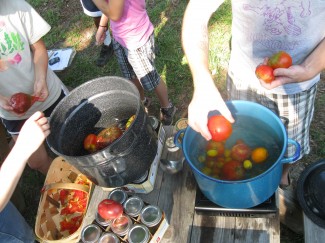


See more photos from the workshop on our Flickr stream.
Farm It Forward
Through the Farm It Forward Partnership of Inter-Faith Food Shuttle (IFFS), Advocates for Health in Action, The Produce Box, and WakeMed’s Energize! program, four families currently enrolled in an IFFS Cooking Matters for Families course have been taking home Produce Boxes each week to practice the skills they are learning in class. The theme for session two of the six-week course was Try It, You’ll Like It, and boy did we! Using fresh, local tomatoes and red peppers from the Produce Box, four families worked together to prepare a delicious salsa and homemade tortilla chips.
The goal of the lesson was to discuss ways families can incorporate more fruits, vegetables and whole grains into their diets. These families shared some great ideas based on the CSA shares they received from the Produce Box the week before. One mom added blueberries to her oatmeal for the first time! Another couldn’t quite use all the green beans, so she froze them to enjoy later this summer. A teen in the class used the veggies to make the healthy mini-pizza recipe we had prepared in the first Cooking Matters session. And we were all blown away by one participant’s amazingly simple method of cooking corn in the microwave.
We can’t wait to see what they come up with next week! Thank you, Produce Box!
Jill & Sun’s Excellent Cuban Adventure: Lessons for Food Production in NC
IFFS Farm Educator, Sun Butler, along with IFFS Co-Founder and Executive Director, Jill Staton Bullard, and IFFS Board Chair, Ardie Gregory, spent June 3-13 in Cuba where they participated in a sustainable agriculture and development conference. They travelled with 23 people from Witness for Peace--an organization dedicated to changing policies that contribute to poverty & oppression in Latin America and the Caribbean. Due to the US embargo on Cuba, there is much that we don't know about that country. For instance, did you know that Cuba used to import 80% of its people's food? With the fall of the Soviet Union in the 1990s, they were faced with dramatic shortages--the average Cuban citizen lost between 20 and 30 pounds as a result! Without food, everyone had to learn to grow food in every single place they could. Now they have turned the tables, and produce 80% of their own food--which is why IFFS traveled there to learn about their organic & sustainable practices. These include pest control through use of beneficial insects and co-planting, and creation of fertilizer from manure and compost.
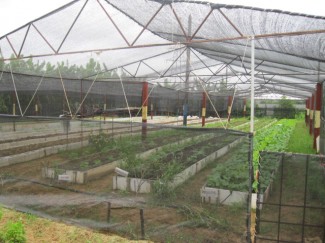
Growing Food In Tight Spaces
The group studied every kind of urban food production: women-owned farms that raise cows to provide milk to schools, neighborhood co-operatives that grow vegetables for food and worms for soil. They climbed up to rooftop gardens, and saw an urban garden that raises both tropical fish for decorative pets and larger fish, such as tilapia, for food. They saw cattle grazing on the grass in highway cloverleafs and corn growing in medians.
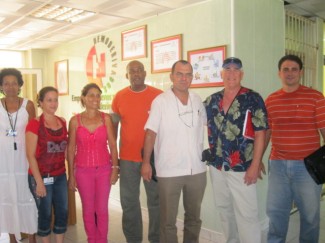
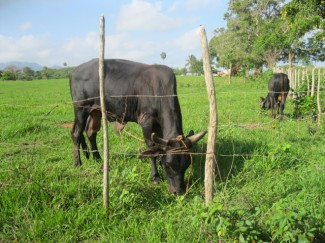
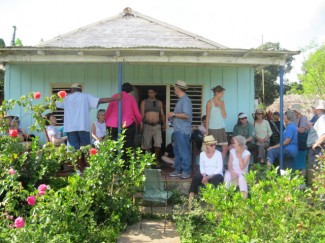

Sun says that he has travelled throughout the Caribbean, and was interested to discover that the Cubans have a higher standard of living, a higher literacy rate, and better medical care than their neighbors. Most important to him, though, is learning from the Cubans how to get by on much less oil & fossil fuels.

Lessons for NC
Recently, Jill and Sun were interviewed on NC Policy Watch about food insecurity in North Carolina and about some of IFFS’s newest innovative solutions to grow a healthy local food system: the Young Farmer Training Program (YFTP) and Urban Agriculture training. Jill and Sun connected what they learned on their recent trip to Cuba back to solutions being developed by IFFS here in North Carolina. Check the full interview out here or read the synopsis below.
North Carolina ranks among top 10 states for food hardship even though agriculture is a $70 billion industry for our state. We are in a similar position to Cuba before the collapse of the Soviet Block, when their main export was sugar from sugarcane. NC may be an agricultural state, but we produce only 20% of our own food. While the economy may be beginning to improve, one in four North Carolina children is still at regular risk of hunger.
Additionally, the average age of our farmers is 57, and not many kids who grow up in agricultural areas are staying home to pass the farm on to the next generation. Through our Young Farmer Training Program, funded by the USDA’s Beginning Farmer and Rancher Development Program, we’re providing hands-on technical training for the next generation of local farmers. IFFS is connecting young people to where their food comes from and making today’s youth aware of career opportunities available in local food production.
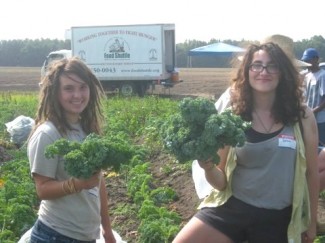
We have the ability to create a healthy local food economy. We can grow food in the same spaces Cuba does - rooftops, backyards, parkland, and open spaces, and we have a population that needs jobs and revenue. With IFFS’ YFTP and Urban Agriculture programs, we’re combining the need for jobs and revenue with the need for healthy local food. We are teaching young people how to make a living out of 5 acres producing local food for the community, fighting hunger by increasing opportunities for local food entrepreneurship and creating jobs.
IFFS has been working to end hunger in our community for over 23 years – we started by putting food on plates for people who didn’t have food, but that alone did not change the paradigm of people who were hungry. So, about 13 years ago, we started job training in culinary skills. Now we are providing workshops and job training around agricultural skills, creating revenue sources for low-wage people, and providing fresh produce for our community.
Jill says
“It is easy to fall in love with Cuba--the country is beautiful, the people are happy, healthy and productive. They were friendly to us, clearly proud of what their country has accomplished and anxious to share their learnings with us. And, let me be clear-- we went to learn. They changed because they had to; we hope to accomplish some of the same pride and food independence because we want to. I pray that we never have to change due to circumstances beyond our control as the Cuban people did. I hope we do it because we need healthier and more nutritious food. I hope we do it because we need to grow the next generation of North Carolina farmers. I hope we do it because we need to have good local foods available in the urban food deserts that plague Raleigh and Durham. I hope we can muster the will, energy and commitment to do it, and do it well.”
Inter-Faith Food Shuttle and Longview School as a Growing Power ROTC: Training Young Farmers and Food Activists
Inter-Faith Food Shuttle and Longview School are proud to partner to become the newest Regional Outreach Training Center (ROTC) for Growing Power. Growing Power is an internationally recognized urban agriculture organization started by MacArthur Genius Award winner Will Allen. We are the only ROTC in the country with a focus on training young people. IFFS’ USDA-sponsored Young Farmer Training Program and Urban Agriculture program carry this focus year-round as we employ and train high school-aged youth and young adults to become North Carolina’s next generation of farmers and food activists. Longview School’s Ag Careers class and Future Farmers of America (FFA) chapter, headed up by Mr. Patrick Faulkner, expose at-risk youths to career opportunities in agriculture and related disciplines. Will Allen has said that “what used to be a good food movement is now a revolution” – Together with Growing Power we are bringing a healthier, more socially just, ecologically sound, and prosperous food future to North Carolina and urban areas throughout the Southeast.

IFFS staff attend Growing Power Commercial Urban Agriculture Training
Thanks to funding from the USDA’s Beginning Farmer and Rancher Development Program, Sun Butler, our Farm Educator and Neal Wisenbaker, our Farm Manager, recently graduated from Growing Power’s Commercial Urban Agriculture (CUA) Training Program. The program is comprised of a series of five weekend seminars running January through May at Growing Power’s training facilities in Milwaukee, Wisconsin. The seminars cover topics around planning (such as city regulations, zoning and licensing), marketing, business plan development, and finding and securing land space. The program also provides hands-on learning experiences in composting, worm farming, aquaponics, fish farming, soil testing, horticulture, farming without chemicals, aquaculture, bee-keeping, small farm equipment and tools, food processing, water usage, and renewable energy, as well as trainings on labor issues and hunger as a social justice issue.
Plant the Pavement! Workshops & Training
As an ROTC, IFFS and Longview will be hosting annual “Plant the Pavement!” workshops starting in fall 2012. These intensive, hands-on training opportunities will offer diverse groups the opportunity to learn, plan, develop, operate, and sustain community food projects. Look for our first round of workshops coming up in November!
- Plant the Pavement! for Triangle Youth: November 8 and 9 at Longview High School in Raleigh. Regional youth interested in agriculture, sustainability, and social justice will have the opportunity to attend a full-day urban ag workshop led by experts from Growing Power, IFFS, and Wake County Public Schools. Topics will include hoop house season extension, vermicomposting, aquaponics, and the basics of sustainable urban food production. Will Allen himself will also be there to discuss how these types of enterprises can empower youth to help their families and communities eat healthier while generating income and jobs. The youth workshop will be offered on both November 8 and 9, and participants can choose which day to attend.
- Plant the Pavement! Community Workshop: November 10 and 11 at the IFFS Wake County Teaching Farm on Tryon Rd. This two-day workshop with Will Allen is open to anyone who is interested in learning more about the sustainable production of healthy food, whether on a home, business, or community scale. Modeled after Growing Power’s “From the Ground Up” workshops, community members who attend this weekend workshop can expect to dive head-first into the nuts and bolts of intensive, sustainable food production for home, community, or market. Skills learned will be applicable in both urban and rural settings, and topics will include composting, hoop house production, vermiculture, aquaponics, mushrooms, micro-greens, project planning, and more!
To learn more about Growing Power’s Commercial Urban Agriculture series, visit their website at http://growingpower.org/
Kids Eat Here Free
For many kids, the meals they receive at school through free and reduced price lunch programs are instrumental in ensuring they get adequate nutrition for their growth and development as well as enough food to fill their bellies. Outside of school, however, many do not know when their next meal will be, where it will come from, or how they will get it.
This summer, we’re eliminating that concern for 300 kids a day. We have partnered with the Raleigh Parks & Recreation Department to provide breakfast, lunch, and snacks for 300 kids a day at 7 sites in the City of Raleigh all throughout the summer, free of charge. Fueled with food, the kids we feed through this program can enjoy summer more fully. Their parents do not have to worry about finding extra resources to cover the meals provided by schools during the academic year.
The kids are all enrolled in summer camps through Raleigh Parks & Recreation. They're providing a fun summer experience for kids who may not otherwise be able to attend summer camp, and we're providing the food. We deliver hot lunches each day to the community centers where the camps are held, including Chavis Center, Worthdale Center, Raleigh Campbell Center, Sanderford Road Center, Sgt. Courtney Johnston Center, and Peach Road Center. In the lobby of Worthdale Center hangs a sign that reads "Kids Eat Here Free."

All the meals conform to federal guidelines for nutritionally balanced meals and are prepared by trainees and graduates of our Culinary Job Training Program.The meal of the day this past Monday: Mexican lasagna, cut pineapple, and salad. Mondays the trucks are also particularly full, bringing bags full of nutritious snacks and breakfast items for the kids to take home for the rest of the week in addition to that day’s lunch.

This is all part of Hunger-Free Summer, a program sponsored in part by ConAgra through Feeding America. It is only by working together that we can truly create a hunger-free community. To learn more about our Children’s Hunger Relief Programs, visit our website: http://foodshuttle.org/we-feed/childrens-hunger-relief/
Mobile Markets in Action!
From BackPacks to a Hunger-Free Summer: Filling the Gap and Feeding Kids
With schools now out for the summer, our BackPack Buddies program has also wrapped up for the season. Each weekend during the school year, we sent the neediest kids home with six balanced meals and two healthy snacks to keep their bellies full over the weekend. Without this program, many students may not have a meal between Friday’s lunch and Monday’s breakfast at school. This academic year we continued to expand the number of children we were able to feed. By the numbers we...
- Worked with 49 sites (up from 38 sites last year)
- Fed 1,460 children (up from 1,036 children last year)
- Distributed 45,098 Backpacks (up from 30, 257 BackPacks last year)
- Provided 270,588 meals (up from 181,542 last year)
- !!!!!!!!!!!!!!!!!!!!!
Starting in August, we will kick off another year of BackPack Buddies, but the need doesn’t end just because school is no longer in session. In our 7 county service area, there are over 111,000 food insecure children who don't always know where their next meal is going to come from. In Wake County alone, 33% of children in school qualify for free and reduced-price lunch. These same children are still hungry during the summer, but no longer have access to the school meals offered weekdays during the school year. That's why we're taking part in Hunger-Free Summer, sponsored in part by ConAgra Foods through Feeding America. We’re providing breakfast, lunch, and snacks throughout the summer to 300 children a day in low-income areas at 7 locations, partnering with Raleigh Parks & Recreation. These nutritious meals are prepared by trainees and graduates of our Culinary Job Training Program.
To learn more about our Children's Hunger Relief Programs, visit http://foodshuttle.org/we-feed/childrens-hunger-relief/Graduation Day: Culinary Students Trained and Job-Ready
Friday, we celebrated three proud graduates of Inter-Faith Food Shuttle’s Culinary Job Training Program (CJTP), our 59th class: Patrick, Larry, and Swapna. These hard-working and dedicated students made it through the 11 week intensive training course and are now prepared for meaningful employment in the food industry.



They’ve mastered knife skills, equipment identification, and cooking terminology. They’ve received hands-on cooking experience under the tutelage of professional Chefs Terri and Will - including cooking techniques, learning how to make stocks, sauces, soups, salads, yeast bread, and quickbreads. They are ServSafe food safety and sanitation certified! But not only have they received the training necessary for obtaining a culinary job and sustaining themselves, but they also now have the skills to maintain that job with professional work habits. Our social worker Sharon Mitchell trains CJTP students in life skills - they learn how to get along with co-workers and how to balance life outside the kitchen. Through the program, CJTP students complete trainings in life and employment skills, stress management, a sexual harassment seminar with InterAct, and a basic nutrition course.
 Sharon described this class of three graduates as not a talkative bunch, nicknaming them ‘The Quiet Storm”: humble in presence, sincere, determined, on-point, and on their job every day with very high character and very high standards for themselves.
Sharon described this class of three graduates as not a talkative bunch, nicknaming them ‘The Quiet Storm”: humble in presence, sincere, determined, on-point, and on their job every day with very high character and very high standards for themselves.
Their final test? The food at the graduation luncheon. By the enthusiastic applause resounding throughout the room, I'd say they passed. The menu for the day included seafood skewers, lemon grilled chicken, herb-roasted potatoes, veggies fresh from the IFFS farms, and jackfruit and rice stuffed peppers, with a fresh garden salad, cut fruit, and rolls to boot. For dessert, the graduates had prepared a delicious zucchini and chocolate cake! After all, the Food Shuttle is all about nutrition (although with how decadent it tasted, you could have fooled me)!
During their time at the Inter-Faith Food Shuttle, they have helped feed their community, converting thousands of pounds of food from a variety of donors into nutritious, well-balanced meals, which are then delivered to local soup kitchens, shelters, children’s programs that feed those in need. CJTP students contribute to increasing local food access and reducing waste through food stabilization – they take fresh produce into our commercial kitchen, cook it into nutritious meals, and blast freeze it so that food with a limited shelf life will be available months later.
But graduation day is not about IFFS, it’s about these students, what they have accomplished, and what they have overcome. Thirteen students began this course 11 weeks ago, but these are the 3 who persevered and made it through to the very end. For graduation, the students can invite anyone they'd like to support them, and many share emotional moments with family and friends recalling the journey that took to be standing there holding that certificate.
Patrick's words of thanks:
Also present are other chefs and community workers who have hosted trainings or helped the students along their path in some way, as well as IFFS staff and board members. Eugene Weeks of the Raleigh City Council even took time out of his day to support and celebrate these new graduates and to congratulate them on behalf of the mayor and the city council.

We work with human services agencies to recruit unemployed and underemployed individuals with severe life challenges. Some of our students have little education, some have never held a steady job, some are recovering addicts, some are homeless, some are leaving abusive relationships. All of them deserve an opportunity to create better lives for themselves and their families. We help them realize their potential. These students will now work with our job coach, Sue Ramey, to find and maintain employment, making sure they have the resources they need to succeed. One of them already has a job secured, and the other two will very likely be working by next week. Congratulations to Larry, Patrick, and Swapna!

IFFS Produce at Raleigh Farmers Markets!
The Food Shuttle Farm is entering the summer season, and cucumbers are bountiful, as are new potatoes and carrots! New this week: Pea shoots and water cress from our aquaponic system! Did you know that you can buy produce grown on our Raleigh Teaching Farm at two Raleigh farmers markets? Come see us at the Midtown Farmers Market on Saturdays 8am-noon and the Downtown Raleigh Farmers Market 10am - 2pm on Wednesdays!
We grow local agricultural opportunities for our Young Farmer Training Program and community members in order to create a healthy and secure local food system. Revenues from our farm sales go to the teen apprentices and to fund Inter-Faith Food Shuttle's proactive hunger relief programs!
This week we have:
- Basil – fresh summer flavor
- Lettuce Mix – Red and green leaf, very pretty and fresh. Spicy mix available, too!
- Water cress – fresh from our aquaponic growing system!
- Pea shoots – bumper crop, 3” tall
- Tri-color Swiss Chard
- Carrots – best in town!
- New potatoes (amazing flavor)
- Yellow Summer Squash – small and tender
- We’ve also got
- Transplants - tomato, pepper, and basil, grown in leaf mold and worm casting
- Soil amendments – red wrigglers to start your own vermicomposting worm bin, worm castings (black gold, the ultimate soil amendment!), and leaf mold (composted and pH neutral)
For more information, contact our farm manager Neal Wisenbaker at Neal@FoodShuttle.org. Look for updates on what's growing at Inter-Faith Food Shuttle's farm and what's available each week at the farmers markets via our Facebook and Twitter!








